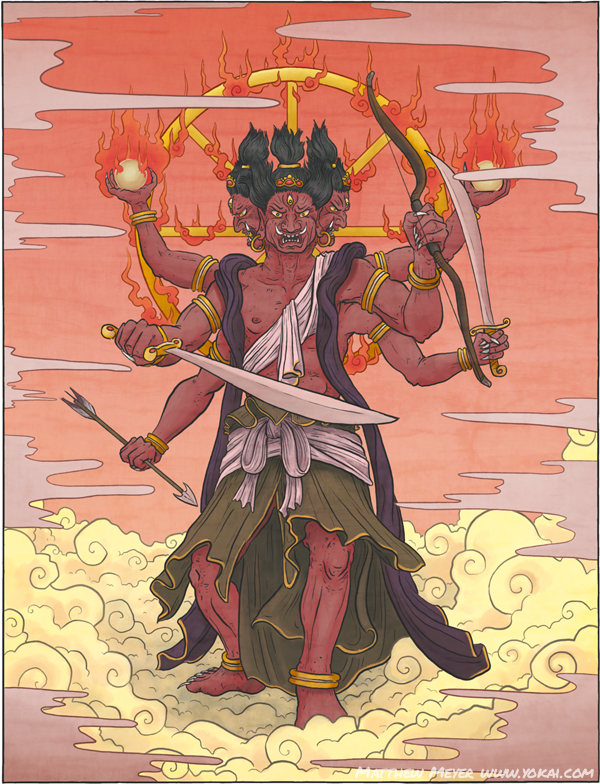Today’s yokai is a pretty cool one. It came to Japan from Indian mythology, which is probably quickly obvious by looking at it.
Religion in Japan is a very interesting thing. Ask a Japanese person what religion they follow, and they will most likely tell you they are some form of Buddhism. Ask a non-Japanese person what religion is followed in Japan, and they will tell you Shinto. In fact, most Japanese don’t really use the word “Shinto” although it is a part of their everyday lives. It’s an odd thing that Westerners have a set definition of Japanese religion that Japanese people don’t really follow…
The reason for this is that Buddhism formed a syncretic religion by merging with local traditions when it came to Japan. This is why you often see shrines and temples occupying the same land, and why Japanese kami are often interpreted as incarnations of Buddhas. Shinto doesn’t really have much in the way of doctrine, and so there hasn’t been much conflict between the two religions when compared with other parts of the world (that’s not to say that there has never been any… just that there has been less).
Unlike some imports from other cultures, ashura came over with very few changes from their Indian counterparts, which is why they still resemble the asura of Vedic mythology. Something that I find totally fascinating, however: historians and linguists who study the proto-Indo-European culture (the theoretical precursor to the languages and religions of most of the land between Europe and India) have suggested a link between the asura of Indian tradition, Ahura Mazda of Zoroastrianism, and the aesir of Norse mythology. Besides the obvious linguistic similarities, there are a lot of similarities behind the myths associated with these beings, including a war between the gods and demons. In Norse mythology, the aesirare the gods we know as Odin, Thor, and so on. Ahura Mazda is the principle god of Zoroastrianism, and asura are a kind of demon in Vedic mythology. In other words, it is possible that the same mythical character eventually evolved into all three of these beings!
When you take that a little bit further, remember that Odin, and aesir, is often said to be the origin of Santa Claus. So, if we really stretch the imagination, could we say that Santa Claus is actually an ashura? Of course, that’s quite silly, but the fact is that you can trace a direct line between the two characters’ histories. As different as European and Japanese traditions are, it’s comforting to know that, when you strip back the layers of time, many of the things that we think make us unique, actually share a common link.
Incidentally, if you’re interested in other cross-cultural connections between Japanese myths and Western myths, I wrote about one much earlier on my blog.
Click below to read about ashura on yokai.com!


i have a question: woill you make an entry about okuninushi and the displacement of islands?
No plans at the moment. Right now I’m only taking requests from my patrons due to high demand.